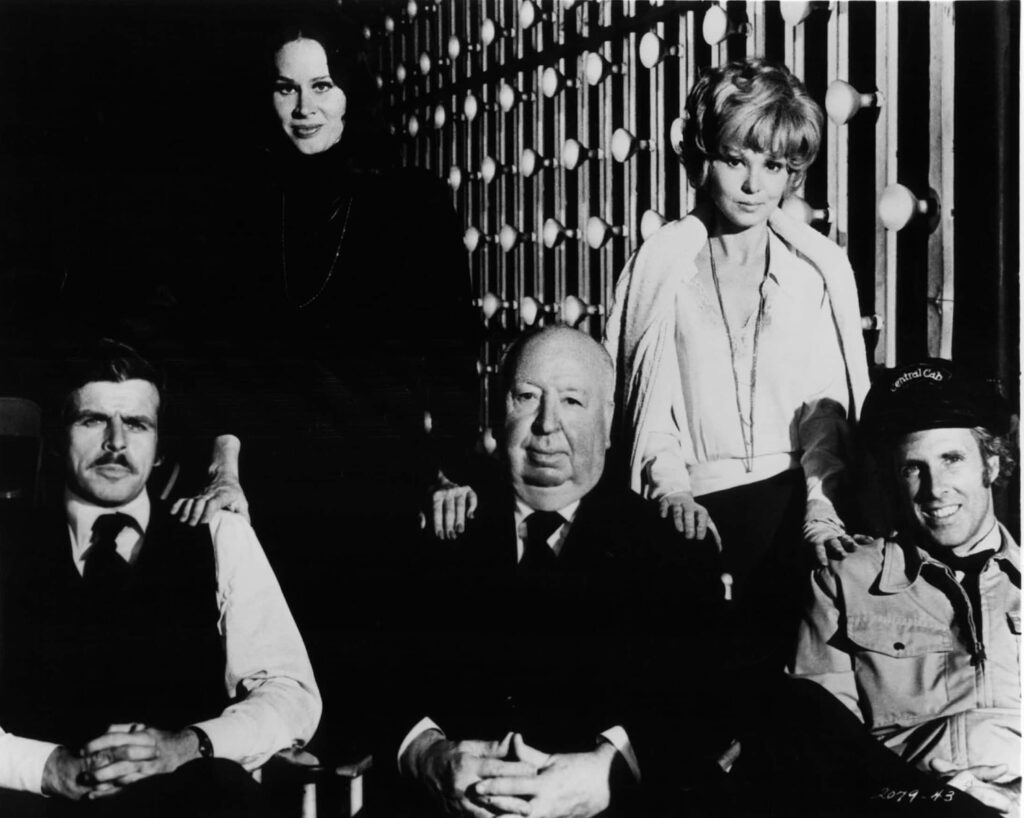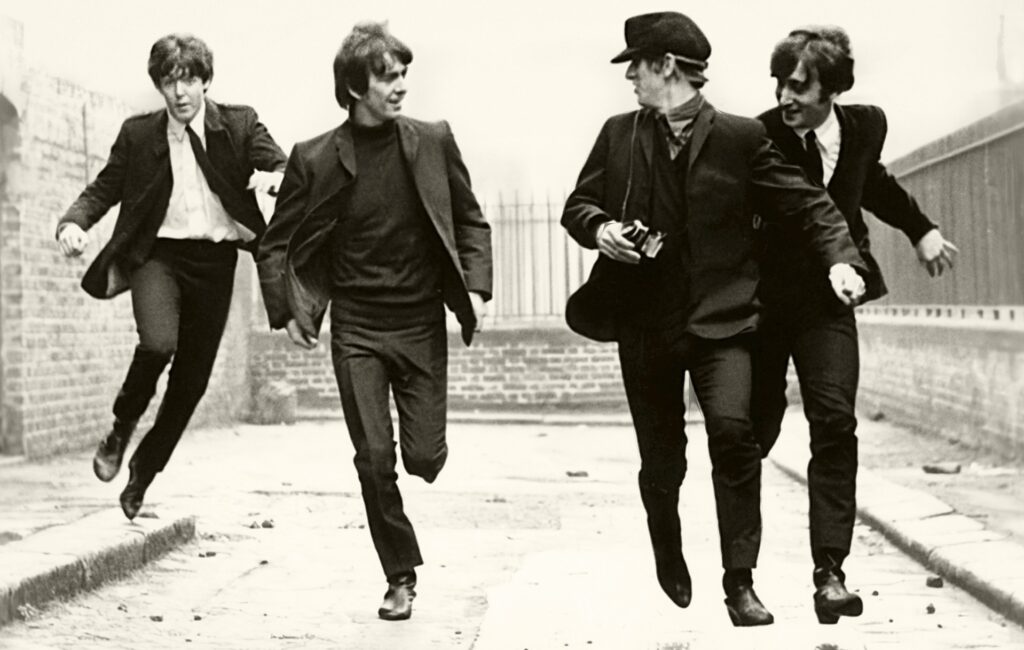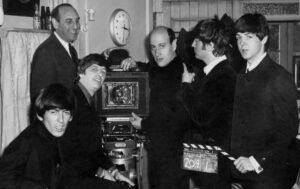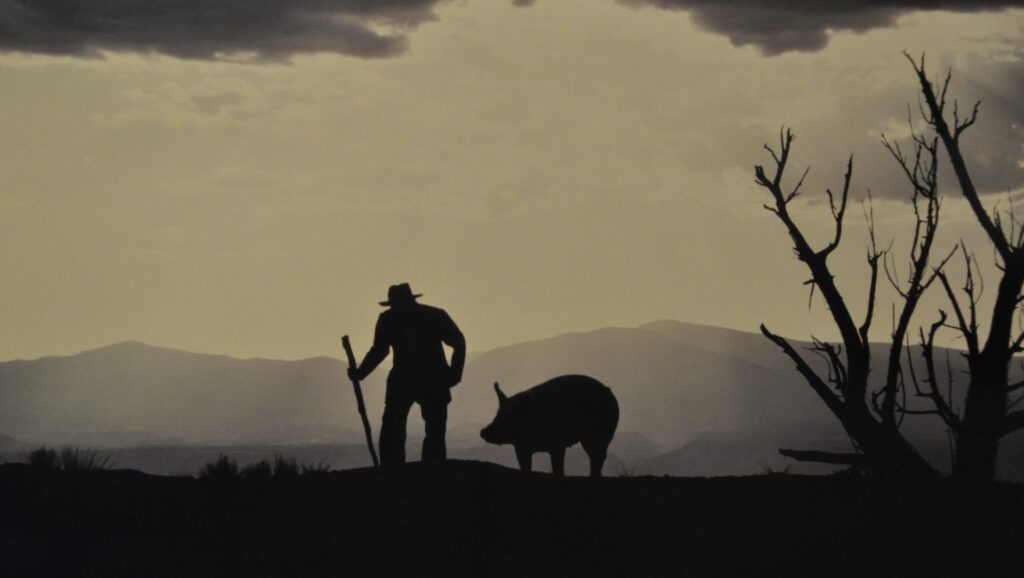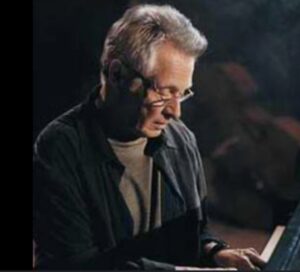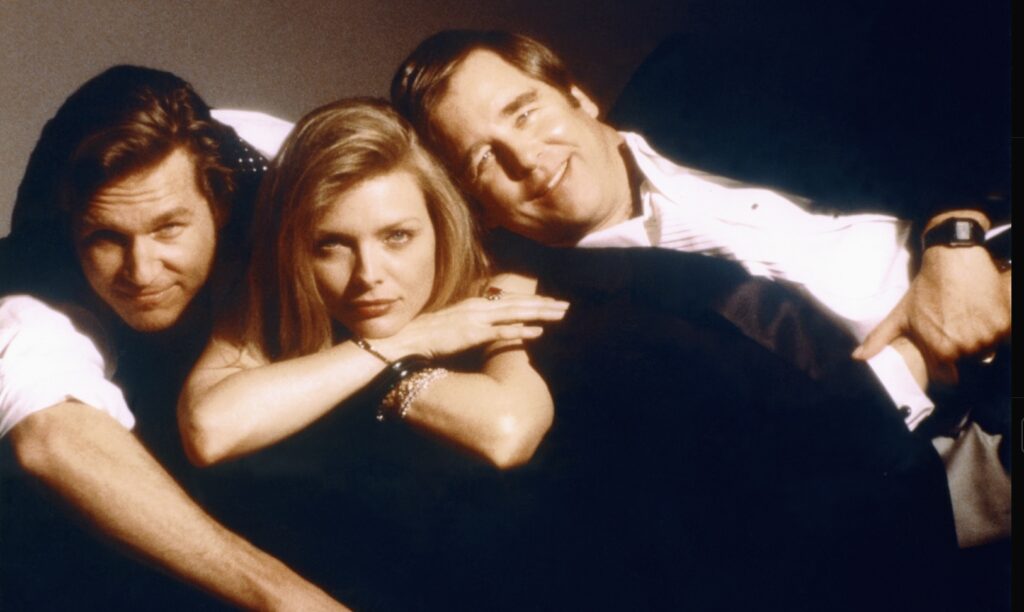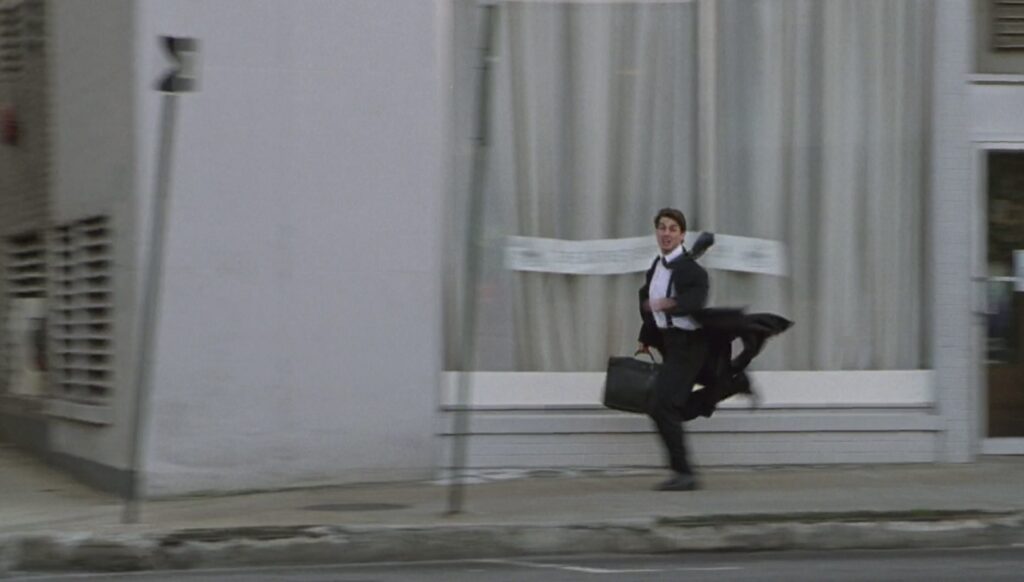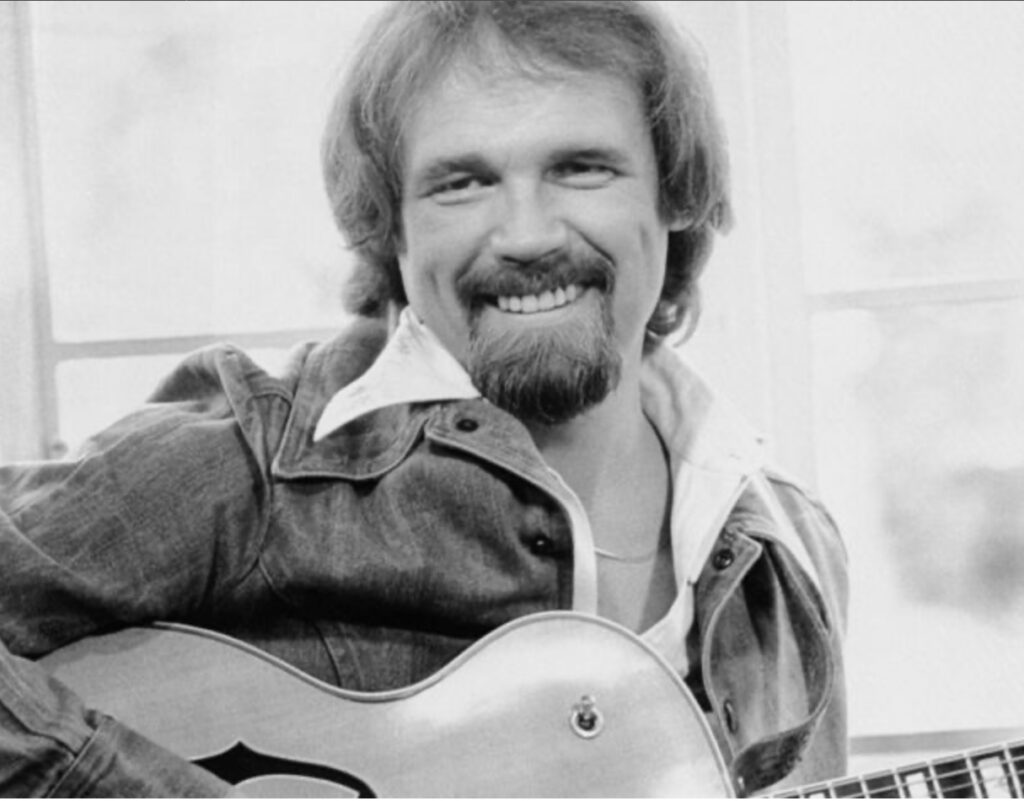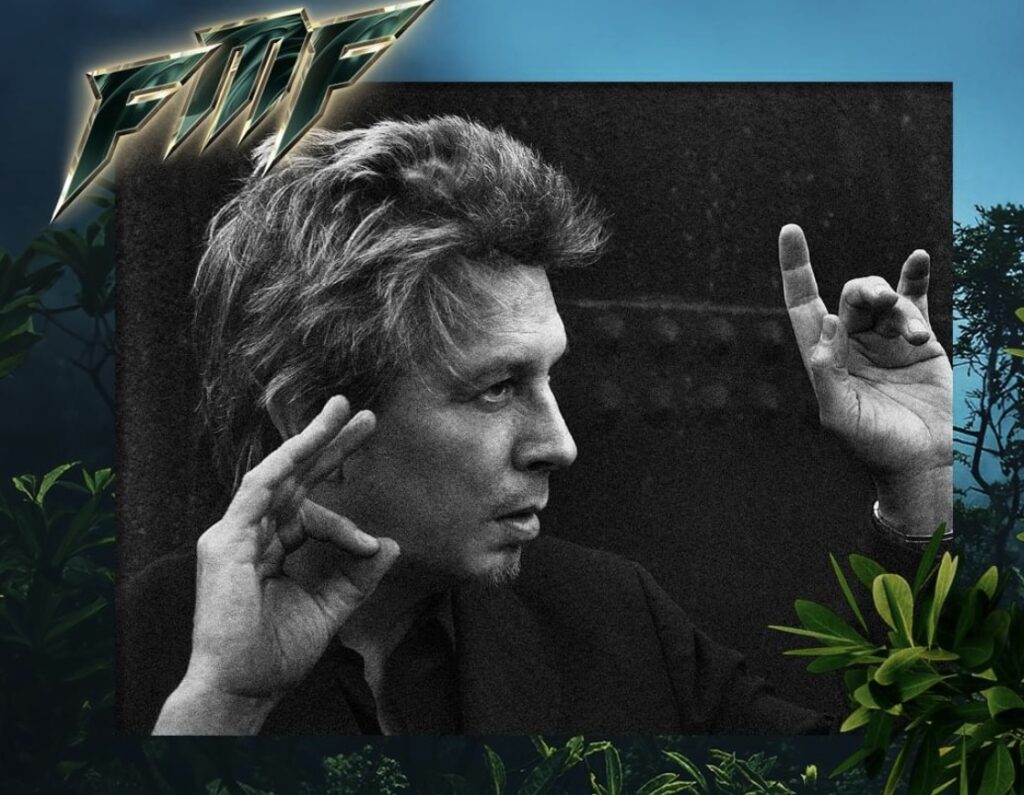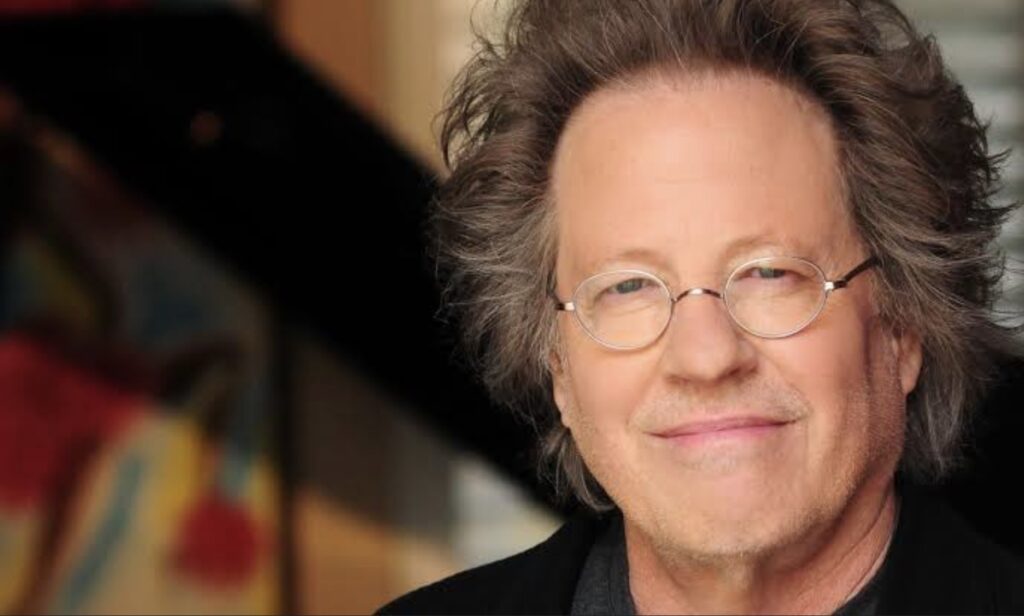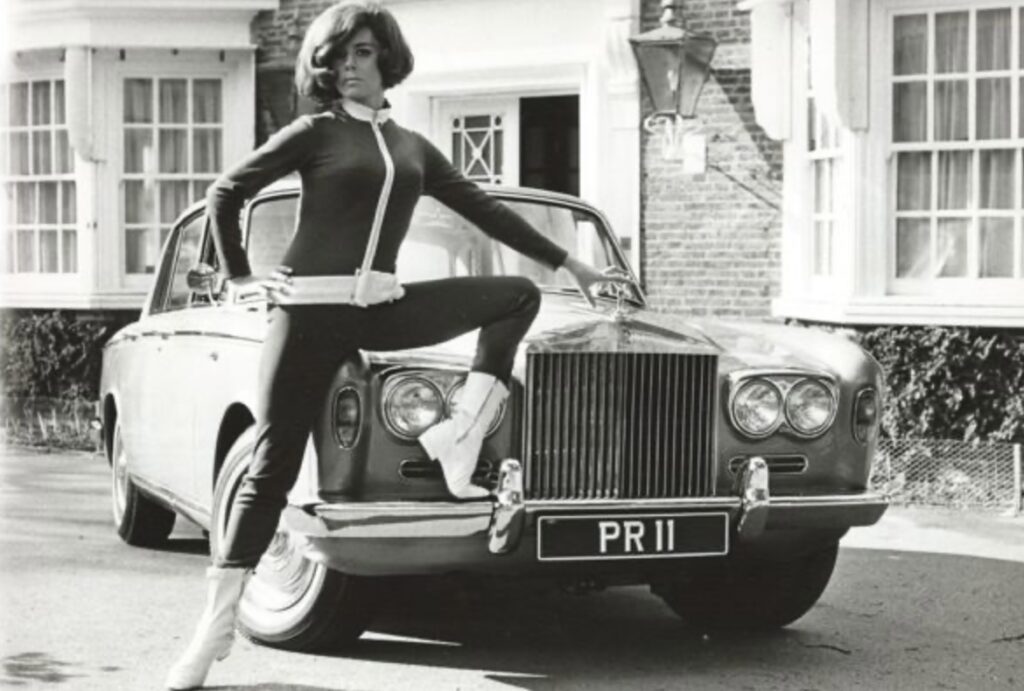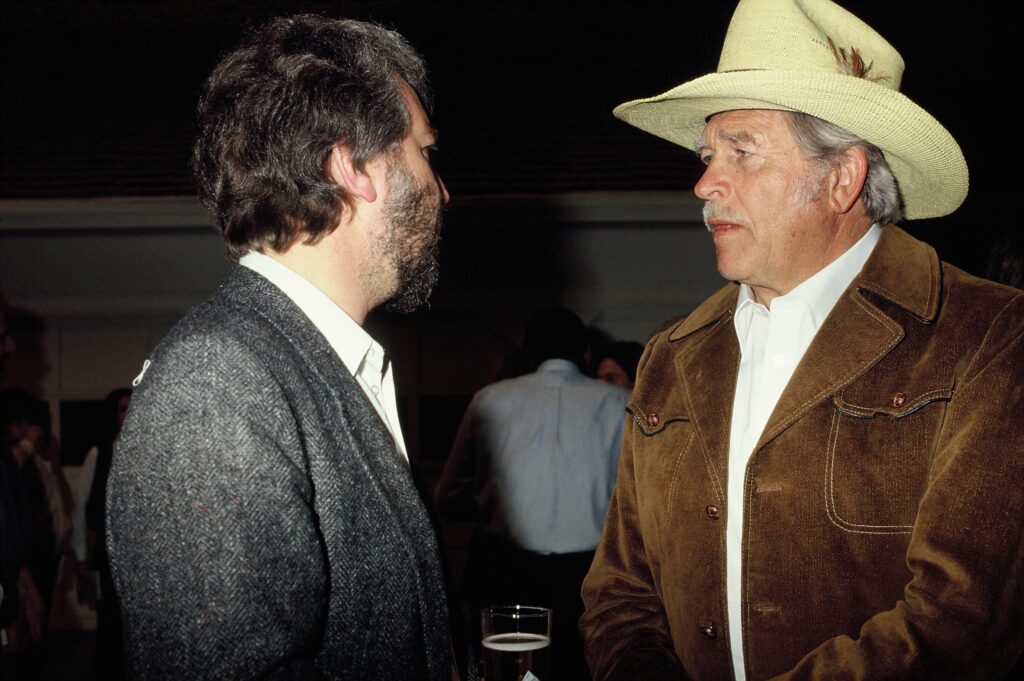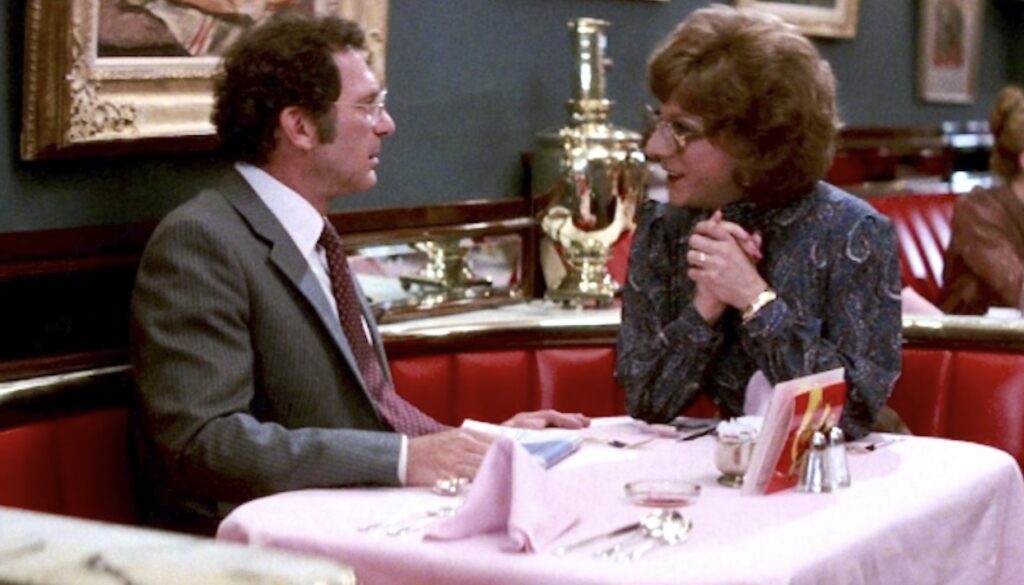 By Ray Bennett
By Ray Bennett
Music has been an intrinsic element of filmmaking since the silent era but not all filmmakers have had a full grasp of how to blend it successfully into a production. Sydney Pollack, who would have turned 90 on July 1, was one who did.
‘I try to be hands-on in terms music,’ he told me when I interviewed him in 2000. ‘I always want to hear what the composer hears but I have a habit that’s sometimes annoying to composers and that is, I usually temp-track a picture.’
He was not alone in that. Many directors like to put a temporary music track behind scenes to help them. ‘Some composers don’t like that,’ he said, ‘because it puts them in a little bit of a box. Some composers say that directors get used to the temp score and then they’re not open to a new score. Directors say in their own defence that they get hooked on the temp score because the temp score works. Somewhere in the middle, I guess, is the truth, depending on what it is the director is trying to do.’
Pollack said he tried to choose music to use as shorthand to communicate to the composer what he meant to achieve with a scene: ‘I try to say, this is what I saw; this is the feeling I’m going after; this is what I think the scene is emotionally.’
 He always chose his temp music himself. ‘I have a big record library, discs and now CDs,’ he told me. ‘I have lots of scores of films and I listen to music all the time. The problem is that sometimes I can’t tell if a scene is working or is too long until I get a piece of music. I wouldn’t know how to edit a film without any music because I wouldn’t be able to tell sometimes about certain scenes, particularly scenes that are just visual.’
He always chose his temp music himself. ‘I have a big record library, discs and now CDs,’ he told me. ‘I have lots of scores of films and I listen to music all the time. The problem is that sometimes I can’t tell if a scene is working or is too long until I get a piece of music. I wouldn’t know how to edit a film without any music because I wouldn’t be able to tell sometimes about certain scenes, particularly scenes that are just visual.’
One example was a scene from his 1985 epic ‘Out of Africa’, based on Danish author Karen Blixen’s memoir starring Meryl Streep and Robert Redford, which was scored by British composer John Barry. ‘In the scene where Redford takes her on a plane ride over Africa, there’s not a word of dialogue,’ he noted. ‘There isn’t any way to know if that scene’s really working until you get music to it.’
Barry, a no-nonsense Yorkshireman, told me he had a terrific time working with Pollack on that film and it worked out well for both them. ‘Out of Africa’ was an international hit winning seven Academy Awards including best picture, best director and best score for Barry, one of five Oscars he won over his career.
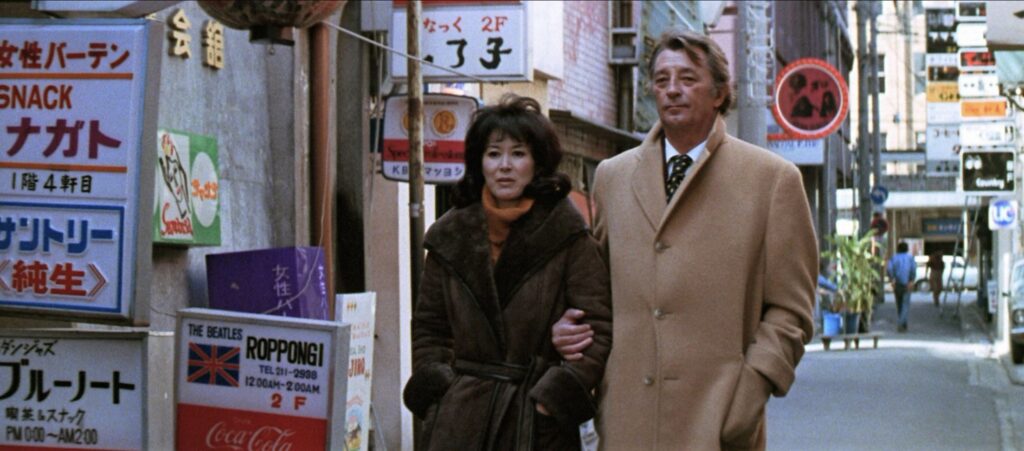 Pollack’s longest collaboration with a composer was with Colorado-born keyboard jazz man Dave Grusin He played and recorded with top artists and worked as an arranger and musical director before providing the music for TV series including ‘The Farmer’s Daughter’, ‘Gidget’ and ‘The Girl From UNCLE’ plus movies such as ‘Waterhole Three’, ‘Candy’ and ‘Winning’.
Pollack’s longest collaboration with a composer was with Colorado-born keyboard jazz man Dave Grusin He played and recorded with top artists and worked as an arranger and musical director before providing the music for TV series including ‘The Farmer’s Daughter’, ‘Gidget’ and ‘The Girl From UNCLE’ plus movies such as ‘Waterhole Three’, ‘Candy’ and ‘Winning’.
Grusin’s score to Robert Ellis Miller’s 1968 film ‘The Heart is a Lonely Hunter,’ starring Alan Arkin as a deaf-mute, was one of the first of his to catch Pollack’s ear. ‘I heard his melodies and they were always memorable,’ he said.
As a result, the director hired the composer to score his 1975 picture, ‘The Yakuza’, about gangsters in Japan starring Robert Mitchum and Keira Kishi (above). ‘It was an odd sort of movie, a romantic action picture,’ Pollack said. ‘I was just knocked out by how he was able to make the music have an ethnic feel of Japanese music but not seem strange to a Western ear. He was able to write melodically and lyrically. If you’re doing a Japanese film in Japan, you obviously don’t want it to sound like American pop. You have to find the flavor of Japan that works. But yet pure Japanese music to the Western ear is not always pleasant. You don’t want to go too far because it’s atonal to us. Dave’s ability to catch those feelings was really extraordinary. He was such a pleasure to work with that I just sort of stuck with him through a whole string of pictures then.’
Their next film was ‘Three Days of the Condor’, a 1975 espionage thriller with Robert Redford. ‘Dave did an extraordinary score to that picture, kind of a jazz thriller score with a very bluesy love theme done on a saxophone, as I remember. He always got great players,’ Pollack said. ‘That score was unique. As a matter of fact, it gets stolen a lot on public television and radio; it gets used over and over and over.’
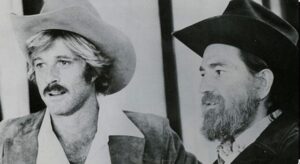 After that, they collaborated on ‘Bobby Deerfield’, a racing drama with Al Pacino and Marthe Heller in 1977; ‘The Electric Horseman’, about a rodeo rider played by Robert Redford and Jane Fonda with Willie Nelson (pictured with Redford, left) in 1979; ‘Absence of Malice’, a newspaper courtroom drama with Paul Newman and Sally Field in 1981; ‘Tootsie’, a comedy about a cross-dressing actor with Dustin Hoffman (with Pollack top picture), Jessica Lange, Teri Garr and Bill Murray in 1982; ‘Havana’, a drama set during the Cuban revolution with Redford and Lena Olin in 1990; ‘The Firm’, a legal thriller with Tom Cruise, Jeanne Triplehorn and Gene Hackman in 1993 and ‘Random Hearts’, a romantic comedy starring Harrison Ford, Kristin Scott Thomas and Greg Kinnear in 1999.
After that, they collaborated on ‘Bobby Deerfield’, a racing drama with Al Pacino and Marthe Heller in 1977; ‘The Electric Horseman’, about a rodeo rider played by Robert Redford and Jane Fonda with Willie Nelson (pictured with Redford, left) in 1979; ‘Absence of Malice’, a newspaper courtroom drama with Paul Newman and Sally Field in 1981; ‘Tootsie’, a comedy about a cross-dressing actor with Dustin Hoffman (with Pollack top picture), Jessica Lange, Teri Garr and Bill Murray in 1982; ‘Havana’, a drama set during the Cuban revolution with Redford and Lena Olin in 1990; ‘The Firm’, a legal thriller with Tom Cruise, Jeanne Triplehorn and Gene Hackman in 1993 and ‘Random Hearts’, a romantic comedy starring Harrison Ford, Kristin Scott Thomas and Greg Kinnear in 1999.
Pollack also produced two films with other directors that used Grusin scores … ‘Honeysuckle Rose’, a country music romance with Willie Nelson, Dyan Cannon and Amy Irving directed by Jerry Schatzberg in 1980 and ‘The Fabulous Baker Boys’, a romantic drama about competing musical brothers with Jeff Bridges, Beau Bridges and Michelle Pfeiffer (below) directed by Steve Kloves in 1989.
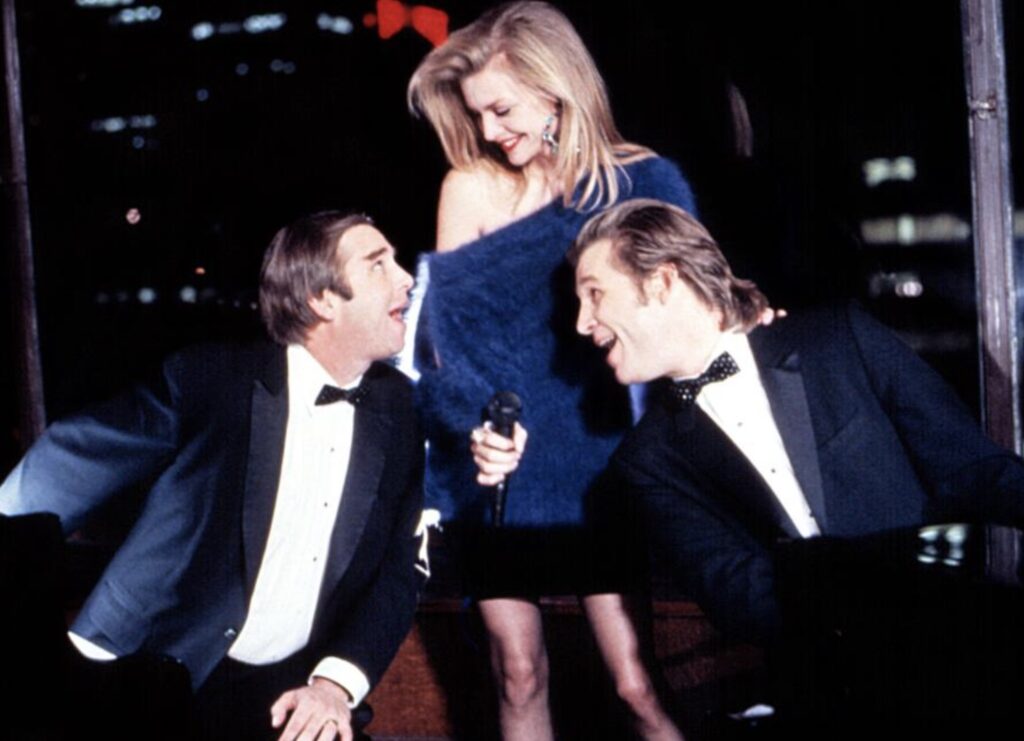 Grusin also worked with other filmmakers including Warren Beatty on ‘Heaven Can Wait’ in 1978 and Robert Redford on ‘The Milagro Beanfield War’ for which he won the Academy Award for best score in 1988.
Grusin also worked with other filmmakers including Warren Beatty on ‘Heaven Can Wait’ in 1978 and Robert Redford on ‘The Milagro Beanfield War’ for which he won the Academy Award for best score in 1988.
‘The thing about Dave Grusin, and I think it’s his blessing and in today’s streamlined world, perhaps part of his curse, is that as a composer he’s a chameleon, he can do anything,” Pollack told me. ‘He really can do jazz; he can do classical, he can do extremely melodic stuff; he can do stuff that’s ethnic. His score for “Heaven Can Wait”, that was a Brechtian score. It had that kind of Kurt Weill sound to it. And then “Milagro” had that incredible Latin magical sound to it. And then, for me, he got Japanese, or he’ll get jazzy on “Condor,” or extremely melancholy on “Dearfield,” or symphonic in “Havana.” His range is enormous. “Havana” was a great score that got nominated.It’s a beautiful, beautiful symphonic score that I still play today. As a matter of fact, I was listening to a track of it this morning, just testing out some clip-on speakers on my laptop and I saw the disc sitting there and I put the big symphonic cue that he did.’
Pollack said Grusin also was extraordinary in terms of his willingness to try to satisfy what he thought a director’s intention was. ‘He will often come in with a whole new concept and it’s usually gonna be better than what you had on the temp,’ the director said. ‘Every once in a while, I get hung up on a temp piece and then I will talk about it and he’ll find a way to try to incorporate what it is about the temp piece that I like. There are certain chase scenes in the films I’ve done with Dave, or certain love scenes, where I’ve really had to put something in temporarily. Sometimes, I’ve been lucky and Dave has written me a bit of a theme before I’ve been in the editing room.’
That was not always possible. ’It’s wonderful but usually it’s impractical, unfortunately,’ Pollack said. ‘It’s hard to get somebody to come on a film that early. The most popular of the film composers are busy; they go from one score to another; they’re doing concerts, or in Dave’s case he’s had a record company to run. He is a soloist, an instrumentalist and a conductor who does tours.’
The director was able to get Grusin into the filmmaking process quite early on ‘Tootsie’, ‘Bobbie Dearfield’, ‘Random Hearts’ and ‘The Firm’ (starring Tom Cruise, pictured with Hal Holbrook below), which had a very different kind of score, one that also was Oscar-nominated.
‘That’s an amazing score,’ Pollack said. ‘What happened was, I didn’t know what to do. I wasn’t sure I was gonna use Dave. I was thinking about him. I went to Memphis and down into the blues areas and I thought this should be Dave because Memphis is a big blues town. Then I started thinking: But I can’t hear a sound to this picture. Usually I can.
‘All I kept thinking was that I didn’t want one of those conventional straight-ahead thriller scores. Because Dave is such a splendid musician, I brought him down to the Cayman Islands while I was shooting. I sat on a weekend with him on the piano at the hotel and just had him play blues, just little blues things.
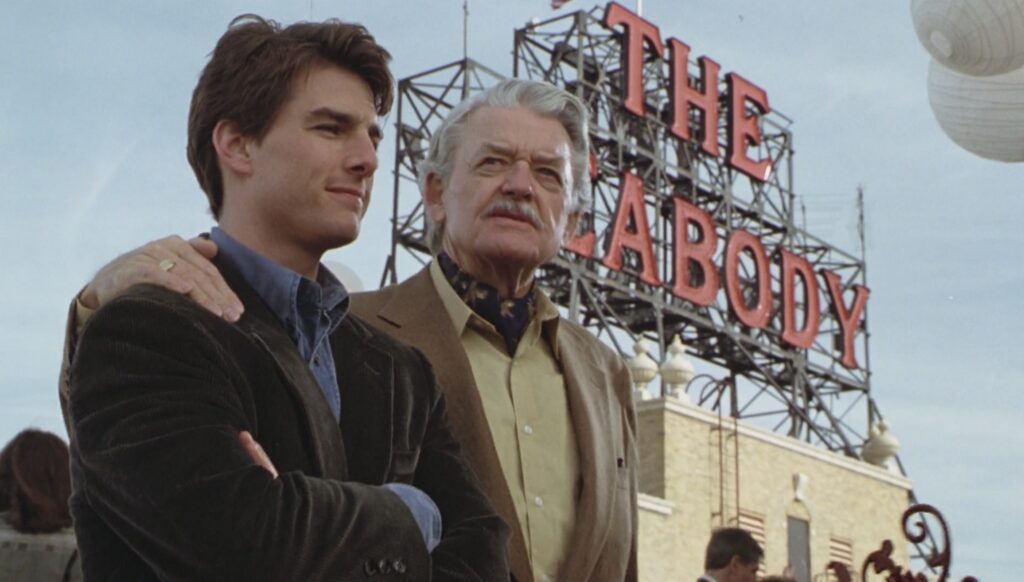 ‘I thought that one of the things that would make it unique was if we were to try doing the whole thing with piano only. That would be a very audacious thing and the only guy in the world I thought could do it was Dave. Scott Rudin, who was a producer with me on the picture, thought that was a terrific idea and he supported me totally on it. I think the studio was a little bit leery because they had a very commercial hot property in the book and suddenly this sounded a little bit weird. But then when they heard it, they all loved it. What he did was amazing because there is nothing but Dave and nothing but a piano in that entire score. There’s a lot of music in that picture.’
‘I thought that one of the things that would make it unique was if we were to try doing the whole thing with piano only. That would be a very audacious thing and the only guy in the world I thought could do it was Dave. Scott Rudin, who was a producer with me on the picture, thought that was a terrific idea and he supported me totally on it. I think the studio was a little bit leery because they had a very commercial hot property in the book and suddenly this sounded a little bit weird. But then when they heard it, they all loved it. What he did was amazing because there is nothing but Dave and nothing but a piano in that entire score. There’s a lot of music in that picture.’
Pollack’s good instincts regarding music were evident from the start in 1965 when he hired Quincy Jones to write the score for his directorial debut, ‘The Slender Thread’, a drama about a suicide hotline starring Sidney Poitier and Anne Bancroft. Jones went on to become a music legend producing major artists and scoring dozens of films with six Academy Award musical nominations.
Elmer Bernstein, whose career also spanned many decades with fourteen Oscar nominations, scored Pollack’s second film, ‘The Scalphunters’, starring Burt Lancaster in 1967. That same year, Bernstein won his only Oscar, for ‘Thoroughly Modern Millie’, a musical starring Julie Andrews and Mary Tyler Moore.
Over his four decades as director and producer, Pollack hired more Oscar-winning composers including Michel Legrand for the surrealistic war picture ‘Castle Keep’ with Burt Lancaster in 1969 and John Williams for the romantic drama ‘Sabrina’, with Harrison Ford and Julia Ormond in 1995.
Legrand landed five Academy Award nominations over his career with wins for best song, ‘The Windmills of Your Mind’ in ‘The Thomas Crown Affair’ in 1968 and best score for ‘Summer of ’42’ in 1971 and Barbra Streisand’s ‘Yentl’ in 1983. Williams, of course, is the acknowledged dean of film composers with almost fifty Oscar nominations and five wins for ‘Fiddler on the Rood’ in 1972, ‘E.T. the Extra Terrestrial’ in 1973, ‘Jaws’ in 1976, ‘, ‘E.T. the Extra Terrestrial’ in 1973, ‘Star Wars: Episode IV – A New Hope’ in 1978 and ‘Schindler’s List’ in 1995.
For his fifth outing as a feature film director, ‘They Shoot Horses, Don’t They’ with Jane Fonda and Gig Young in 1969, Pollack selected composer Johnny Green, who had won Oscars for ‘West Side Story’ in 1962 and ‘Oliver!’ in 1969. Green picked up another Academy Award nomination for Pollack’s film.
Pollack admitted that he was ambivalent about using songs in movies. ‘Normally, to me, songs take you out of the story but that’s the new style, so that’s what we do,’ he said. ‘It depends on the picture. Certain kinds of movies, you can do it and it works. If you’re doing a very hip kind of contemporary thing, you’re very able to do it well. It depends.’
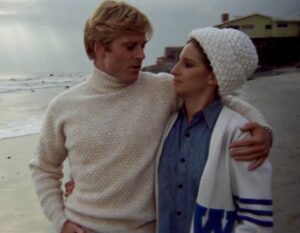 He did make pictures where he felt that a song was truly merited. One was ‘The Way We Were’ in 1973, starring Barbara Streisand and Robert Redford. Composer Marvin Hamlisch won the Oscar for best score and he along with lyricists Alan and Marilyn Bergman won the award for best song for the title number.
He did make pictures where he felt that a song was truly merited. One was ‘The Way We Were’ in 1973, starring Barbara Streisand and Robert Redford. Composer Marvin Hamlisch won the Oscar for best score and he along with lyricists Alan and Marilyn Bergman won the award for best song for the title number.
He used songs in ‘Electric Horseman; because he had Willie Nelson. ’It seemed a shame to have Willie and not use him,’ he said, ‘particularly since I was doing a picture about a horse out West. It just seemed ridiculous not to do it. But Dave Grusin did all those orchestrations. We went to Nashville and recorded most of eight songs.’ Nelson was Oscar-nominated one year later for the song ‘On the Road Again’ in ‘Honeysuckle Rose’, which Pollack produced.
Grusin and lyricists the Bergmans were Oscar-nominated for the song ‘It Might be You’ sung by Stephen Bishop in ‘Tootsie’ and the song ‘Moonlight’ by John Williams and the Bergmans, sung by Michael Dees, was nominated for ‘Sabrina’. Anthony Minghella’s ‘Cold Mountain’, which Pollack produced, nabbed Oscar noms for composer Gabriel Yared while the songs ’Scarlet Tide’ by T-Bone Burnett and Elvis Costello and ‘You Will Be My Ain True Love’ by Sting also were nominated.
Sydney Pollack died on May 26 2008 aged 73.
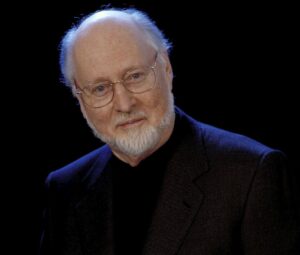 ‘He was a man full of marvellous stories and history. It was a great experience being in his presence. He was a lover of Edward Elgar, I think, more than anything. He talked about Elgar and Gustav Holtz all the time and was very interested in Walton. Of course, he had a long relationship with Bernard Herrmann, who was a great friend of mine.’
‘He was a man full of marvellous stories and history. It was a great experience being in his presence. He was a lover of Edward Elgar, I think, more than anything. He talked about Elgar and Gustav Holtz all the time and was very interested in Walton. Of course, he had a long relationship with Bernard Herrmann, who was a great friend of mine.’ 
